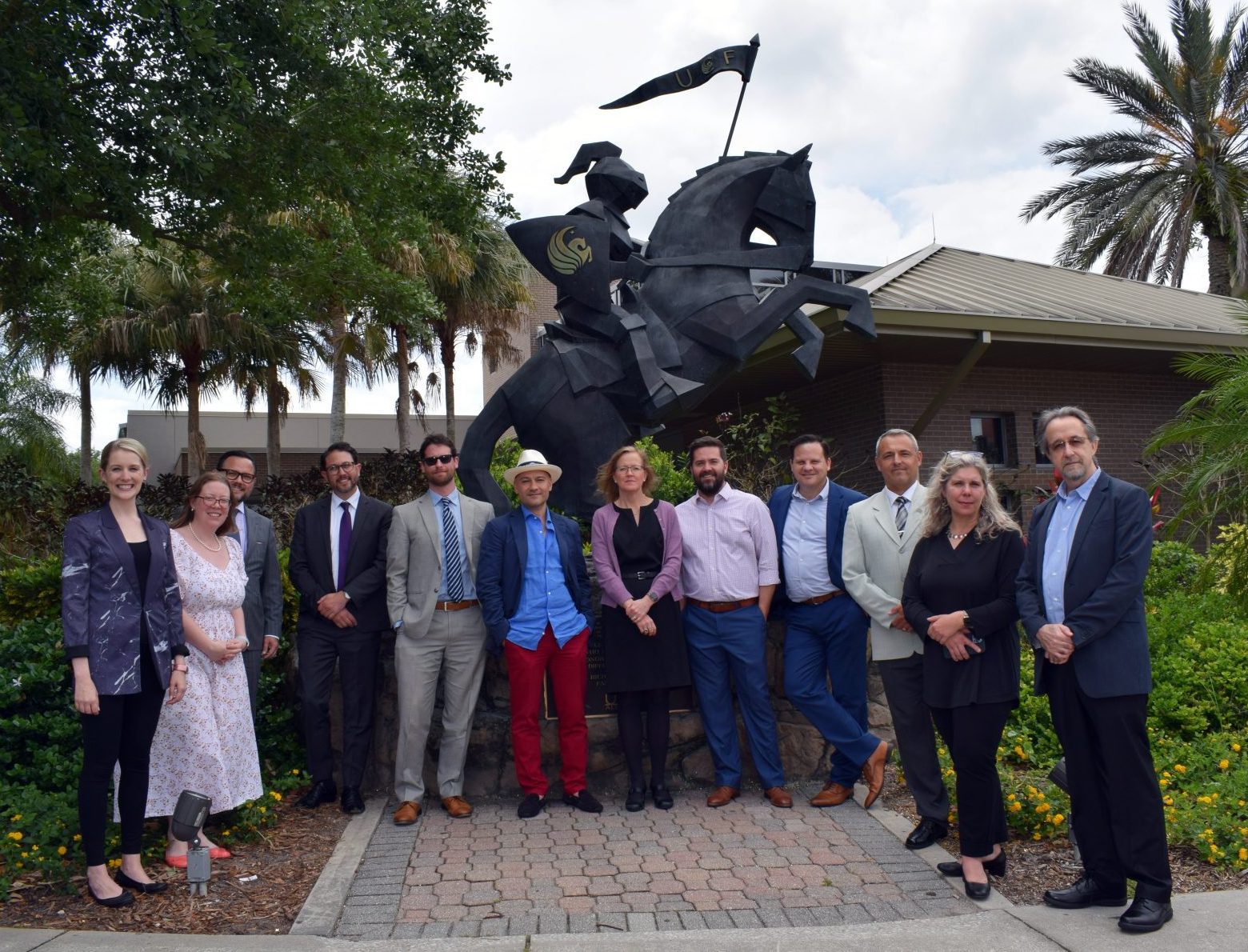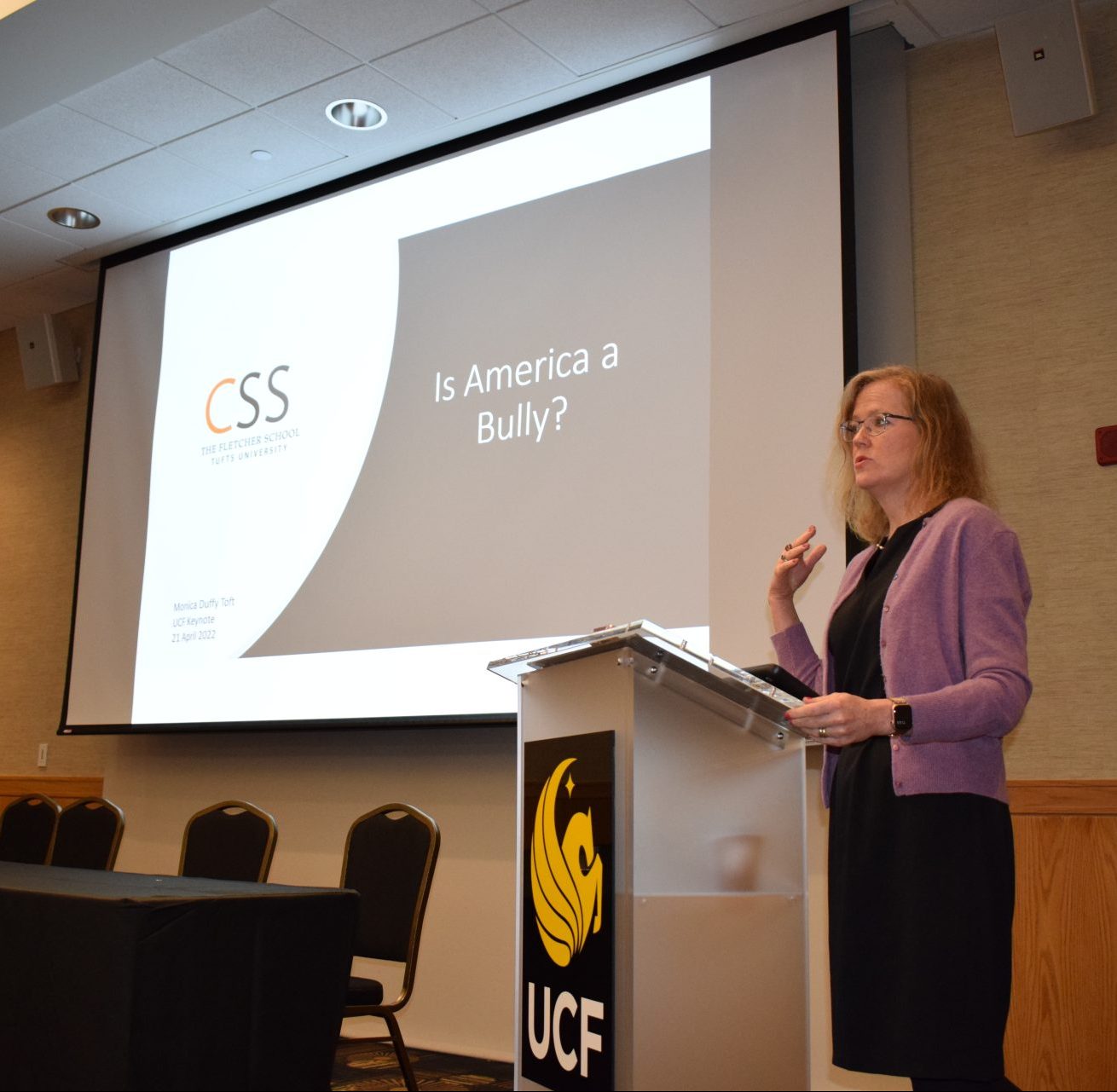Foreign Policy Making in Turbulent Times

On Thursday, April 21, 2022, the School of Politics, Security, and International Affairs (SPSIA) organized its landmark event of Spring 2022 – the American Foreign Policy and Intelligence Conference. Speakers (from Left to Right) Kelsey Larsen, Emma Ashford, David Oakley, Morgan Kaplan, Stephen Coulthart, Güneş Murat Tezcür, Monica Duffy Toft, Andrew Boutton, Jonathan Powell, Sandor Fabian, Jennifer Brick Murtazashvili, Michael Mousseau.
BY: Léa Faure
On Thursday, April 21, 2022, the School of Politics, Security, and International Affairs (SPSIA) organized its landmark event of Spring 2022 – the American Foreign Policy and Intelligence Conference. The conference attracted a lively audience which featured 10 scholars and experts who provided unique perspectives about American foreign policy and intelligence in the wake of the withdrawal from Afghanistan in August 2021 and the ongoing Russian invasion of Ukraine. While the U.S. foreign policy and intelligence establishment has been subject of widespread criticisms for the swift fall of Kabul to Taliban forces, they have also been praised for providing accurate predictions of Russian intentions in Ukraine.
After the introductions by Maggy Tomova, College of Sciences Dean, and Güneş Murat Tezcür, SPSIA Director and host of the event, the conference featured three panels and a keynote address. The speakers addressed the general geopolitical implications of the U.S. withdrawal from Afghanistan and Iraq, dynamics that contribute and hinder the partnerships the U.S. establishes with its local allies, competing goals of counterterrorism, counterinsurgency, state-building and democracy promotion, as well as how political concerns affect intelligence assessments and vice versa.
The first panel of the day, moderated by Dr. Michael Mousseau of SPSIA, focused on the goals of U.S. involvement in Iraq, Afghanistan, and Syria. Dr. Emma Ashford, Resident Senior Fellow at the Scowcroft Center for Strategy and Security at the Atlantic Council, presented a realist perspective about the U.S. involvement in the Middle East and argued that there is a mismatch between the U.S. goals and its heavy military presence in the region. Dr. Kelsey Larsen of SPSIA offered a political psychology perspective about how emotions shape local people’s responses to U.S. military presence in countries like Afghanistan and pointed out to the limits of initiatives to gain popular support in invaded lands. The third speaker, Dr. Jennifer Brick Murtazashvili, Associate Professor and Director of the Center for Governance and Markets at the University of Pittsburgh, observed how Afghan views of the U.S. have evolved negatively over the years and the lack of popular legitimacy characterizing the Afghan government based on her repeated visits to the country. The discussion, beyond the Middle Eastern context, brought a substantive and engaging analysis of the Ukraine-Russia situation.

Dr. Monica Duffy Toft, Professor and Director of the Center for Strategic Studies at Tufts University, delivered the keynote speech titled “Is America a Bully?“
Dr. Monica Duffy Toft, Professor and Director of the Center for Strategic Studies at Tufts University, delivered the keynote speech on the U.S. military interventions abroad. Marshaling a novel dataset about these interventions, Dr. Toft has identified 393 such interventions from 1997 to 2019. Most of these interventions took place in the post-WWII period with the longest one being the twenty year invasion of Afghanistan. Dr. Toft has argued that heavy U.S. military deployments overseas lack public support are not aligned with national interests and diminish American influence globally. She has called for the greater role of diplomacy and intelligence in American foreign policy making.
The second panel of the day “U.S. Relations with Local Forces” was moderated by Dr. Jonathan Powell of SPSIA. Dr. Andrew Boutton of SPSIA, started off the discussion by offering a critical perspective about the effectiveness of U.S. military assistance to weak states. He also presented U.S. aid to Ukraine as a more successful example. Dr. Morgan Kaplan, Foreign Policy Scholar, focused on the U.S. relations with non-state actors such as the Iraqi and Syrian Kurdish parties. According to Dr. Kaplan, these relations are often driven by expediency at the expense of long-term strategic planning. Finally, Dr. Sandor Fabian of NATO Special Operations School presented an insightful discussion of the legacies and complexities of the U.S. military aid and collaborations from the partner perspective. He has argued too much support could backfire and generate unintended consequences.
The last panel of the day, moderated by Jennifer Hudson, a PhD candidate at SPSIA, focused on the complicated relationship between intelligence and foreign policy making. Dr. Stephen Coulthart, Associate Professor at the University of Albany presented a timely discussion about open-source data and volunteer networks appearing on Internet sphere in conflict zones such as Ukraine, coining the term of OS-RVN (Open Source Research Volunteer Networks). Dr. Tom Dolan of SPSIA offered an intriguing analysis by comparing the successes and failures of U.S. and French intelligence assessments in Afghanistan and Ukraine. Dr. David Oakley, Associate Professor at the Joint Special Operations University, complemented these perspectives by discussing the competing notions of goals of intelligence and the ways in which politicians may instrumentalize intelligence.
The conference was co-sponsored by the Intelligence Community Center for Academic Excellence, the Kurdish Political Studies Program and the College of Graduate Studies.

